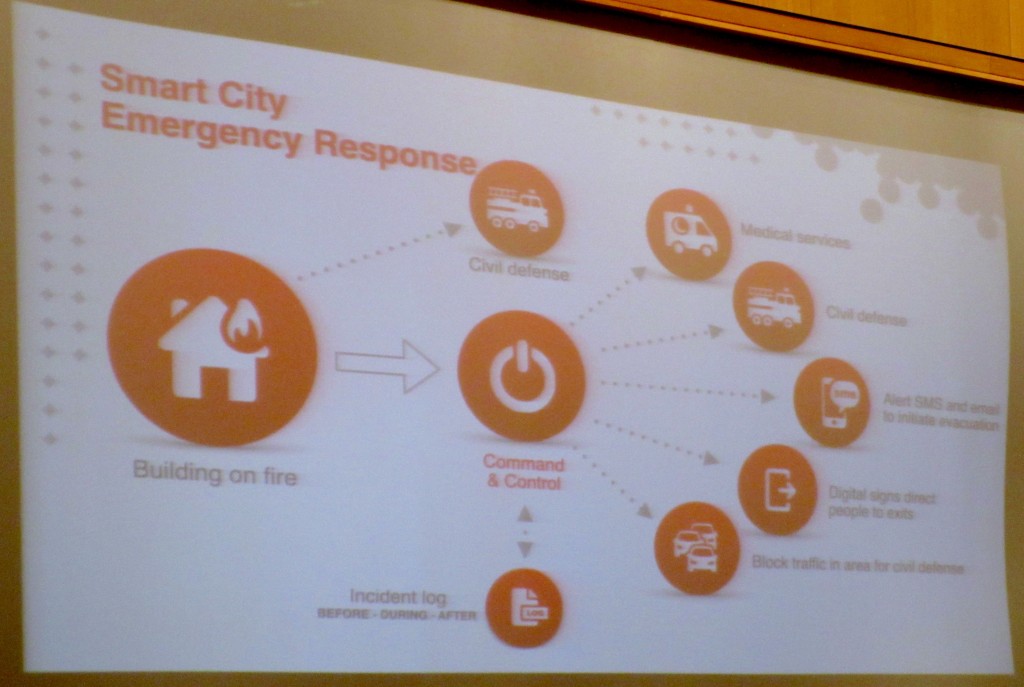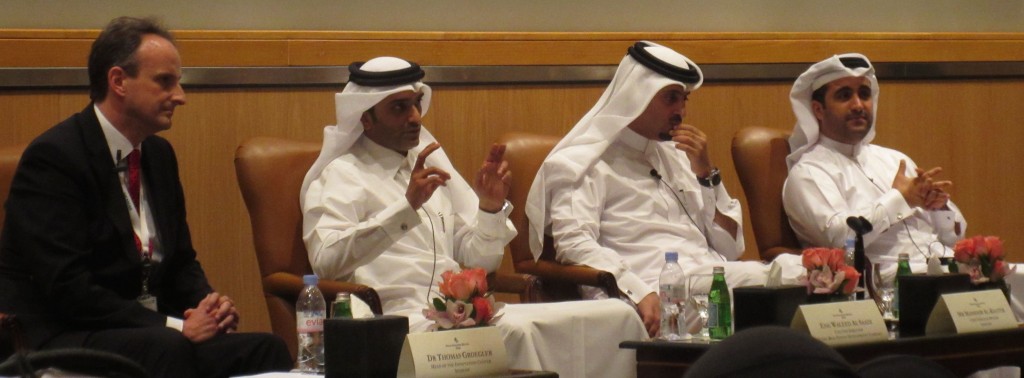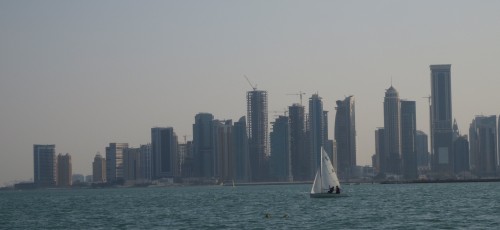Driving into the Qatar Science and Technology Park (QSTP), one is struck with the sweeping architecture reflecting a fast-paced ambition to evolve. There are moments in Doha where you can see the future. Places like QSTP very much demonstrate the active efforts of many to change a city and country. It is only fitting that such a place would host the Smart Cities: Dreams to Reality Tech Talk.
(Photo: Dr.Thomas Groegler, Waleed Al Saadi, Mansoor Al-Khater and Abdulaziz Ahmed Al-Khal)
The event opened with Mansoor Al-Khater: Chief Strategy Officer of Ooredoo Qatar (a national telco) asking: How can use the huge amount of data to push economic development? Building on his wide-angle lens vision of Smart Cities, he set that tone outlining the potential of smart city technologies. Examples included using smart city technology to change traffic flows to divert from accidents/volume or notify citizens in case of emergencies. But, he emphasized that Smart cities are not just about the technology. It is a shift in culture and how we interact with our cities.
Mr. Abdulaziz Ahmed Al-Khal, Chief Commercial Officer at Qatar Mobility Innovations Center (QMIC) highlighted some points about why smart cities will matter to the citizens. He asked us how startups can spark from organic ideas to full technical platforms. QMIC is a partner of Qatar Computing Research Institute. In my time at QCRI, I’ve had a chance to meet a number of the staff and review their platforms. There are over 300 sensors on the various streets and roads around Doha. These sensors stream to real-time maps and provide large data insights into traffic flow. This is one of the growing issues as the city population expands faster than the infrastructure build. While QMIC is seeking to build businesses and foster data-driven startups, QCRI is along on this journey to use our data analytics brainpower and ponder how social computing (how humans interact and provide data via social media.).
Doha is a mix of old city and new city, but Qatar is building Lusail from scratch as a Smart City. This is really a long tail plan. You can read about it on the Lusail website. Having driven by this city, I really am more curious now the city in the making will evolve. Engineer Waleed Al Saadi invited people to explore the Lusail progress. I’ll add it to the list right after visiting the Msherieb enrichment centre. This part of Doha is set to be the most wired and sustainable area.
Lastly Dr. Thomas Groegler, Head of the Innovation Center of Siemens, reminded us that with all this technology and dreaming, we need to deeply consider and address how the smart city work will increase the digital divide, improve or decrease accessibility and, most importantly, effect all parts of physical and digital security. Points taken. Truly, it is with these realities that we must be mindful of our decisions and engage citizens.
How does this relate to our work at QCRI?
At QCRI Social Computing, we have two research and development streams that directly intersect with smart city activities: Social Media in Disaster and Resilient Cities. It is exciting to consider how our work can support and measure the national goals. As a digital humanitarian, I see how a network of Digital Qatar could support this emergency chart. While the formal organizations will use sensors and SMS, there is still a need to consider how social media in Qatar would be used during an emergency. This is about preparedness and an engaged citizenery.

Doha has a way to go to improve as we journey down the Smart City Path. Listed as #41 on the Sustainable City Index, there are standards and programmes to build to engage citizens in what they need from their city as well to foster the brightest entrepreneurs to use data to grow businesses to support the needs of various communities. Smart City Doha needs to keep building a civic tech community. There are pockets of amazing social entrepreneurship and technology groups. These just need to be activated more.

